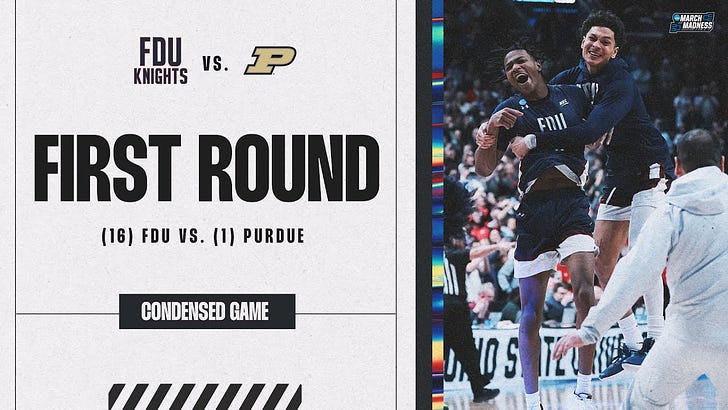Hey, readers! Before diving into this installment of The Press Break, please enjoy some of my NCAA Tournament coverage elsewhere. Links:
For Padres Superfan Eric Musselman, Arkansas’ Sweet 16 Run Could Be The Start of a Big Sports Year (The San Diego Union-Tribune)
How the 3-Pointer Reshaped March Madness (FloHoops)
Furman’s Frank Selvy and the 100-Point Game That Defined a TV Sensation (AwfulAnnouncing.com)
Mrs. Kensing came home from work last Thursday and asked, “Did Arizona win?”
When I broke the news that the second-seeded Wildcats coughed up a double-digit-point lead in the second half of its loss to 15th-seeded Princeton, she gasped and covered her mouth, predictably shocked by our alma mater’s failure.
Our 8-year-old son chimed in, “They should call it March Badness!” As I looked at his wide, hockey-player-like smile with the gaps from lost baby teeth — him exceptionally pleased with his rhyming pun — it added perspective.
College basketball and football players barely qualify as adults and are now closer in age to my oldest child than they are to me, despite representing the same university from which I graduated.
In general, I have learned to detach myself from fandom working as a sports journalist. Prominent outlets leaning aggressively into personalities presenting themselves as unabashed homers violates a core tenet, and while I certainly got into sports growing up as a fan, I understand there’s a responsibility in letting go some of that in order to be as objective as possible.
That said, it requires a more concerted effort with a university I attended as opposed to, say, the San Antonio Spurs. I first heard the cliche of a college’s athletic department functioning as the entire university’s “front porch” speaking with former Central Michigan coach John Bonamego in 2017, and the analogy nicely reflects the role of college sports.
A university’s teams are often the first thing outsiders see of a school. So, when your alma mater loses a highly visible game and gets roundly mocked, it can feel like your entire collegiate experience is belittled. Such is the curse of the college sports fan.
But another realization came to me looking at my son: A basketball or football game doesn’t change the experiences any of us enjoyed in college, erase the friendships we made or devalue our education. Without my time as a student at Arizona, I wouldn’t have my quick-witted 8-year-old son there to ease the mood with his jokes, since his mother and I met as undergrads and fell in love as Wildcats.
Likewise, I probably wouldn’t be writing this newsletter entry from my hotel room in Las Vegas ahead of covering the Sweet 16 were it not for my Journalism degree, or without my Daily Wildcat editors allowing me the opportunity to report on my first NCAA Tournament back in 2005.
And my experiences are not unique. A pillar of March Madness’ popularity is the nostalgia and sentimentality it invokes, reminding us of those special, formative years that shape our lives.
Another pillar, of course, are the inevitable upsets. Fairleigh Dickinson shocking No. 1-seed Purdue a little more than 24 hours day after Princeton beat Arizona reemphasized the unpredictability of March Madness — an unpredictability that radiates with the same kind of general energy you experience as a college student, the belief that life’s possibilities are endless.
Then, at yesterday’s West Regional media day, I asked UCLA star Jaime Jaquez Jr. about his decision to put an NBA career on hold for a year so that he could attend college alongside his younger sisters, a freshman on the Bruins women’s basketball team.
“This is just a big transition in everyone's life when they go to college,” Jaquez said. “She's learning how to live by herself, on her own, and kind of finding her own way in life. I think that's really cool as an older brother just to see my little sister grow up in front of my eyes.”
Not everyone gets to experience college with a sibling, but the UCLA brother/sister tandem made me think of my own children — 8, 4 and 20 months — and the possibilities they have to grow with each other at pivotal times in life.
Sports can prop up a mirror in front of our own lives, and March Madness is especially great about this. So much of the Tournament’s essence is the humanity it spotlights.
Humanity doesn’t exist without moments of pain, but the hurt doesn’t last. Neither does March Badness.



